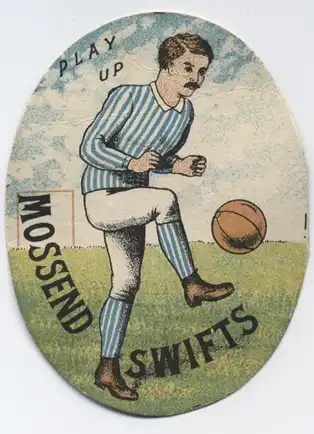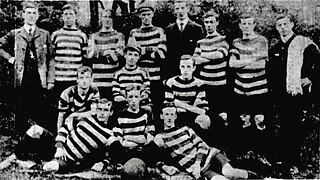Rangers Football Club was a Scottish football team located in the town of Greenock, Renfrewshire.
Contents
| Full name | Rangers F.C. | |
|---|---|---|
| Founded | 1881 | |
| Dissolved | 1889 | |
| Ground | Wellington Park | |
| Hon. Secretary | Wm. Hendry | |
| Match Secretary | Duncan M'Vicar | |
Rangers Football Club was a Scottish football team located in the town of Greenock, Renfrewshire.
| Full name | Rangers F.C. | |
|---|---|---|
| Founded | 1881 | |
| Dissolved | 1889 | |
| Ground | Wellington Park | |
| Hon. Secretary | Wm. Hendry | |
| Match Secretary | Duncan M'Vicar | |
The club was founded in 1881. Despite the existence of the already-famous Rangers in Glasgow, the Greenock club's official name was also simply Rangers, although the Scottish Football Association recorded it as Rangers (Greenock), and the media usually referred to the club as Greenock Rangers. It replaced Wellington Park at the ground of the same name.
The club turned senior in 1884 by joining the Scottish Football Association. [1] It entered the 1884–85 Scottish Cup, but was hammered 12–1 by Cartvale in the first round; [2] its first entry into the Renfrewshire Cup was almost as disastrous, with an 11–1 home defeat to Neilston. [3] It did however win a tie in the Greenock & District Charity Cup, 5–3 at 1st R.R.V.; it was the club's only competitive victory. [4]
At the time Rangers turned senior, Greenock had a number of clubs, including senior clubs Southern, Greenock Rovers, Lyle Athletic, Northern (Greenock), Morton, and the 1st R.R.V.; between them, they had 320 members, but St Mirren in nearby Paisley had 300 members alone. With 30 members, Rangers was the joint-smallest of them. [5]
However, in 1885, it claimed a 189 members, which would have made it the biggest of the clubs in the town. [6] Nevertheless, it still lost in the first round of the 1885–86 Scottish Cup, 5–1 at Johnstone, and in the first round of the Renfrewshire. The membership figure may be a mistake as by 1886 it had reduced to 60. [7]
Either way, the club was singularly unsuccessful. In four Scottish Cup entries and five Renfrewshire Cup entries, it never won a tie. The only time it reached the second round of the Scottish Cup was in 1886–87, when it successfully protested the 1st R.R.V. for fielding two unregistered players. [8] [9] In the second round Rangers lost 8–2 at Abercorn. [10]
The club had one minor recognition when secretary John B. Walker was elected President of the Renfrewshire F.A. in 1887. [11] It did not help the club - it suffered another double-digit defeat in the national cup and withdrew from the county after arriving late for the tie at Renfrew. The club was considered defunct by 1888–89, with doubts about the club being able to take part in its Scottish Cup tie [12] that season with Pollokshaws Harp justified when the team withdrew; it did however manage to get together a scratch side [13] for the Renfrewshire Cup tie at Port Glasgow Athletic, which ended in another double-digit defeat. [14] the club finally gave up the unequal struggle, not renewing its Scottish FA subscription for the 1889–90 season. [15] The club continued at a new ground as a Junior side, under former secretary M'Vicar, until 1890 [16] and a second side of the same name was formed in 1892. [17]
The club wore navy blue and white 1" hooped jerseys, white knickers, and red stockings. [18]
The club firstly played at Wellington Park, at the foot of Whinhill, 5 minutes' walk from Lynedoch railway station. [19] In 1886 it moved to Ladyburn Park. [20]
Thornliebank Football Club was a football club that existed between 1875 and 1907, based in Thornliebank, Renfrewshire, Scotland.
Bute Rangers Football Club was a Scottish association football club based in the town of Rothesay on the Isle of Bute.

Mossend Swifts were a Scottish senior football club from the shale mining village of Mossend, just to the north of the town of West Calder, West Lothian. There is now little left of this village.
Cartvale Football Club was a shortlived football club from Busby, East Renfrewshire that existed from 1878 until 1890. The club regularly competed in the Scottish Cup and reached the semi-finals in 1882.
Renfrew Football Club was a Scottish football team located in the town of Renfrew.
Shettleston Football Club was a football club from Shettleston in Glasgow.
Lochwinnoch Football Club was a 19th-century Scottish football team located in the village of Lochwinnoch, Renfrewshire.
Yoker Football Club was an association football club based in the Scottish town of Yoker, now part of Glasgow.
Pollokshaws Football Club was a Scottish football team, based in Pollokshaws, now part of Glasgow.
Neilston Football Club was a Scottish football team, based in Neilston, in Renfrewshire, Scotland.
Johnstone Rovers Football Club was a football club based in Johnstone, Renfrewshire, in Scotland.
Johnstone Harp Football Club was a football club based in Johnstone, Renfrewshire, in Scotland.
The 1st Renfrewshire Rifle Volunteers Football Club was a 19th-century association football club based in Greenock, Scotland.
Woodvale Football Club was a football club based in Thornliebank, Renfrewshire, in Scotland.
Clippens Football Club was a Scottish football team from the town of Linwood, Renfrewshire.

Kilbarchan Football Club was a Scottish football team located in the village of Kilbarchan, Renfrewshire.
Crieff Football Club was a football club from the village of Crieff, Perthshire, Scotland.
Pollokshaws Harp Football Club was a Scottish football team, based in Pollokshaws, now part of Glasgow.
Southern Football Club was a Scottish football team located in the town of Greenock, Renfrewshire.
Northern Football Club was a Scottish football team located in the town of Greenock, Renfrewshire.